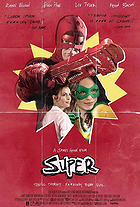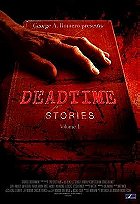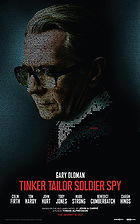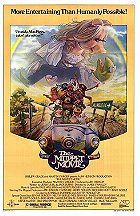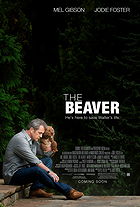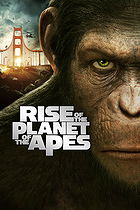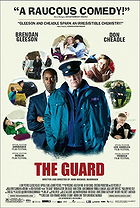The word "okay" is the most apt adjective for 2011's J. Edgar, Clint Eastwood's unambitious but handsomely-mounted biopic of one of the most interesting men of the 20th Century. The direction is okay and the acting is merely okay... Apart from lavish sets and (mostly) stunning makeup, nothing stands out as memorable or above-average in this blatant piece of Oscar bait. It's a shame, too, as the production was blessed with a lot of talent: Clint Eastwood at the helm, Leonardo DiCaprio in the lead, Brian Grazer & Ron Howard producing, and even Dustin Lance Black (Milk) behind the script. The mention of such names only serves to heighten the disappointment that the flick represents. This is Eastwood's laziest effort in years. Perhaps the former acting heavyweight is just getting too old to be patient with his craft.

From an early age, John Edgar Hoover (DiCaprio) showed determination to defend America from the Communist and criminal scum posing a threat to his beloved nation. Becoming a law enforcer in his 20s, Hoover worked his way through the ranks to become the Director of the FBI, where he introduced revolutionary methods such as forensics and fingerprinting. Hoover was also notorious for embellishing stories to the public, claiming to have personally taken down outlaws like John Dillinger and Alvin Karpis. Meanwhile, Hoover's personal life was a mess. Behind closed doors he was a closet homosexual: he maintained a long-term relationship with his second-in-command Clyde Tolson (Hammer), but was afraid that his sexual orientation may harm his image and legacy.
The retelling of Hoover's life is framed around the man dictating his life story and professional triumphs to various assistants to form the basis for an upcoming book. It's a clever storytelling method in theory, as it allows the script to explore Hoover's insatiable quest to eternally preserve himself as a great man in the eyes of the public. The device almost works...almost. While it permits a window into Hoover's psyche, it denies the chance to genuinely get into the more controversial and unsavoury aspects of his character. And when the chance finally arises for such aspects to be exposed, Black squanders the opportunity. See, at one point Clyde confronts Hoover about events he either sensationalised or outright made up in his memoirs. But this idea is dropped after a short single scene, denying Clyde the chance to provide further insights.

The key problems with J. Edgar stem from both Dustin Lance Black's script and Clint Eastwood's handling of it. Rather than examining Hoover's extensive commitment to the FBI, the flick simply runs through several key events without any sort of consistent through line. Black's flawed script lacks ambition, too. The writer was keen to open up several cans of worms - including Hoover's homosexuality and rumoured cross-dressing - but he can only watch them wriggle around. A lot of time is dedicated to showing Hoover and Tolson spending time together, yet the relationship is too tasteful and gutless. It's a shallow depiction of their romantic involvement, harmlessly observing them but never going under the surface to explore their love. Instead, it boils down to a lot of clandestine glances and dialogue of scattershot quality. Granted, Black's point was most likely that Hoover was just tragically stubborn and was unable to embrace his full self since he was living in an era of narrow-mindedness, but something more daring would have made for more enthralling cinema. This is too dry. History books also reveal countless fascinating things about Hoover (especially in his later life), barely any of which were incorporated into the finished movie. Things are played too safe, and the film lacks the guts to be ambitious. What a wasted opportunity.
Added to this, the script's nonlinear approach is ineffective; it haphazardly leaps around the timeline for no particular reason when a more straightforward retelling would have worked far better. Clint's direction exacerbates this issue; a handful of scene transitions are poor, and there's a distinct lack of focus and discipline. The editing, too, feels lazy. Admittedly, however, J. Edgar gets better as it moves along, with the amateurish opening segment giving way to a number of enthralling scenes throughout the midsection. Most successful are the scenes dealing with the Lindbergh baby kidnapping, which are so engaging that the subplot should have been given its own movie. The makeup deserves a mention, too. DiCaprio and Watts look especially convincing as the older versions of their characters, though the makeup job on Armie Hammer looks positively ghastly.

For all of the cynical critics dismissively saying that Leonardo DiCaprio is in pure Oscar baiting mode here, the actor is surprisingly mixed. His accent at no point feels convincingly lived-in; it feels like Clint used his trademark one-take method all the time, never permitting Leo the chance to feel comfortable in Hoover's skin. His voice doesn't entirely convince; it seems to be a random mix of his real voice and a forced accent, which is bewildering since he's one of the finest actors of this generation. Additionally, Leo's voice remains the same as Hoover ages, which betrays the convincing makeup effects. Billy Crudup was far more authentic and memorable as J. Edgar Hoover in 2009's Public Enemies (a superior flick). The rest of the acting, though, is more successful. Armie Hammer excellently embodies the role of Clyde Tolson, and he's completely believable as he runs through various challenging emotions. Meanwhile, despite a thankless role, Naomi Watts impresses as Hoover's loyal secretary, and Judi Dench is her usual exceptional self as Hoover's mother. Also worth mentioning is Josh Lucas, who's very good as Charles Lindbergh.
Viewers seeking profound insight into the life and personality of J. Edgar Hoover will have to look elsewhere - Eastwood's movie is a strictly superficial affair which only teases, resulting in an incomplete filmic sketch of this fascinating man. Interesting to note, J. Edgar was originally slated for a mid-late 2012 release, but was pulled forward a year...after filming had wrapped. Another year of post-production could have facilitated reshoots, stronger editing, and generally more care. What we're left with feels like an early rough cut that only occasionally shows promise of what it could have been. J. Edgar is not bad per se - it's just an underwhelming, limp career overview of someone who deserves a far more substantial biopic. Just think of what someone like Oliver Stone could've made of this project...
5.7/10
 Login
Login
 Home
Home 183 Lists
183 Lists 1665 Reviews
1665 Reviews Collections
Collections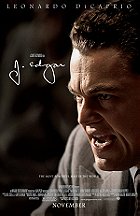
 0 comments,
0 comments, 